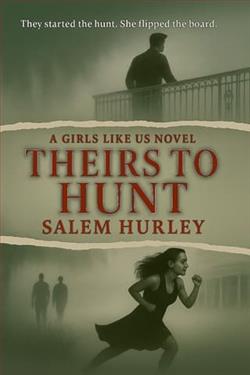Page 12 of The Nature of a Lady
She wiped her hands on a napkin—refraining from licking her fingers as a silent nod to Invisible Edith—and moved to the door. When she opened it, however, she didn’t find a woman, as she’d expected. She found a man, this one dressed in the rougher garb of a fisherman.
And he looked her over as ifshewere the one who didn’t belong in her doorway, his brows knit. “Elizabeth?”
Her brows no doubt mirrored his. “Yes. And you are?”
He started at the question, frown deepening. “Here.” Somehow she didn’t think that was his answer to her question—she’d never heard of Here as a surname, though what did she know? Perhaps it was Cornish. But he held out an innocuous-looking white rectangle, marking the word as command instead of answer.
An envelope, that was all. WithElizabethscrawled on the front.
Was he just a courier? But who in the world would send her a note with no address on it, only her name? Mabena, perhaps? But she would have putLadyElizabeth on it—unless she was trying to obey, at least in small part, Libby’s desire to go unnoticed.
She forced a smile and took the letter. “Thank you, Mr. Here. Oh—here.” She reached into her pocket and fished around for one of the coins she always kept there for such purposes.
Pressing it to his palm earned her another look of supreme consternation. “Em ... thanks?”
A strange courier. Maybe the Scillonians just always ran errands for each other, as friends, and didn’t expect tips for it. That would be rather lovely of them, wouldn’t it? Her smile feeling a little brighter, she said, “You’re welcome. Good day.” And closed the door.
Not until she turned back to the table, gaze falling to the envelope, did she look closely enough to recognize that this was most assuredly not Mabena’s handwriting. It was, in fact, masculine rather thanfeminine. But whatmanwould be writing to her? The only one she could think of was Bram, but it wasn’t his hand either. And he never called her Elizabeth. He had, in fact, been the one to nickname her Libby when they were children.
She flipped it over, looking for some clue. But all the turn revealed was that the envelope was sealed. No indication of who had sent it or from where.
Her gaze flicked to the table, where the lead ball rested on its paper. Where the book sat with its odd notes in the margins. Where some other Elizabeth’s possessions invaded Libby’s world.
The envelope wasn’t for her—of that she was suddenly quite certain. Whoever the previous tenant had been, she was still getting deliveries, as surely as her belongings had still been in the drawers. And while curiosity pricked, Libby set the envelope on the table beside the cannonball without opening it.
It was one thing to have unwrapped the paper and string when she didn’t realize it wasn’t meant for her. It seemed somehow different to unseal a letter intended for someone else. And though she was many things of which society disapproved, she’d never been the sort to go snooping through someone else’s post.
When Mabena got back this evening, she’d tell her all about the two strange men with their unsolicited gifts and see whatshethought they should do about it.
In the meantime, she still had half a sandwich and a beach full of creatures and plants she’d yet to explore. Putting aside the other questions—and the marked-up book, too, since it only bred more of them—she finished her lunch and gathered a new armful of supplies for her afternoon. She’d spend an hour or two out collecting a few specimens for closer inspection and then get her microscope out later. She’d already determined that three o’clock would be the perfect time to set up the device at the desk by the window, when the light would be streaming inside in quantities ideal for reflecting off the mirror.
It was enough to make a girl positively giddy. She’d only had the microscope for a few months—Mama and Bram had given it to herfor Christmas—and she’d already examined the cellular structure of everything she had even a mild curiosity about at Telford Hall. But who knew what might beg for a closer look here?
Armed with a basket full of slides and containers, pincers, and a scalpel, she all but skipped back down the path to the shore. She’d get a sample of the seagrasses and see if they were any different from the kind that grew at home. Perhaps she’d find a small jelly washed ashore that she could look at. For that matter, looking at water itself under magnification could reveal the most fascinating small oddities in it. How would seawater appear, as opposed to the fresh variety from the small lake at Telford Hall?
She spent a happy two hours collecting a variety of samples, blissfully ignoring the laughter and shouts from other tourists along the beach. None of them cared a whit who she was or what she was doing, which suited her perfectly. There was no brother to scowl at her and warn her to adjust her hat before she burned even worse. No sister to chide her for crouching down in an unladylike fashion. No mother to beg her to come and sit with her for a while.
Though she had a feeling she’d miss that last one in another day or two. Time spent with Mama was rarely anything but pleasant.
And, she granted as she winced upon brushing her hand against her nose, afewwarnings about better protecting her skin from the sun might not have gone awry.
But no matter. Bent on enjoying her new freedom to the full, back at her desk, she let “Chorus of Furies” spill from her lips at top volume as she set up her microscope, angled the mirror to send a brilliant ray of illumination through the slide and up into the eyepiece, and lined up her samples. Microscope work always broughtOrfeoto her mind and her lips, much like painting didCarmen. Bram teased her mercilessly about her propensity to sing opera while she worked, so she usually hummed it instead of outright singing. But Bram wasn’t here to poke fun, so she let her chest and throat expand fully through “e lo spaventino gli urli di Cerbero.”
She opened up the correct notebook to a fresh page and twistedthe cap off her fountain pen, using it as a baton to conduct herself into the final bars, her favorite part. “Seun Dio no—”
Before she could get out the piercing final word, a knock pounded its way through her one-girl opera. Her hands froze in midair, the right one raised, ready for the downbeat that would go along with the final “e.”
Her cheeks went hot. What if whoever was at the door had heard her? Her finale turned to a squeak that faded into a moan. She lowered her pen-turned-baton-turned-pen-again, tossed it to the desk with the notebook, and scurried to the front door.
If it was another delivery for Other Elizabeth, she would just have to be truthful. Tell him she wasn’t who he was looking for. Ask him to kindly inform all other nameless givers of oddities that they ought to direct their deliveries elsewhere for the rest of the summer.
She pulled the door open, fully prepared to greet her latest visitor with an apology for not being who he sought. But the words froze on her lips as surely as the closing bars of “Chorus of Furies” had.
It was a man, yes. But he wasn’t altogether unfamiliar. And he didn’t lift his brows and ask if she was Elizabeth.
No, he frowned as if the whole weight of the islands had crashed down upon his brows. “Where’s my sister?”
His sister? Libby blinked, blinked again. Opened her mouth, but no words would come. She could only stare at the too-long hair, nearly black; the too-dark eyes, drowning in worry; the too-often imagined lips, not speaking now of plant species.















